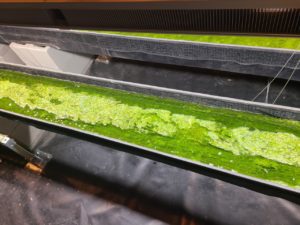
Algae, that slimy green plant matter that clings to the water’s surface and rocks in a lot of Colorado rivers, may someday solve global issues related to water, climate change, and natural resources. Jason Quinn, an associate professor from the Department of Mechanical Engineering, and his research team will pursue algae’s usefulness as a biofuel with a $3 million grant from the U.S. Department of Energy.
Quinn sees algae as an exciting biological solution to challenging problems. When placed in contaminated water, algae can filter out nutrients that promote growth of harmful algal blooms, such as the ones occurring in Colorado waters. Still, its benefits go far beyond water, as algae can remove carbon from the air and can also be used as a sustainable replacement for fossil fuel-based products from plastic to gasoline.
In his own lab, the Sustainability Research Laboratory, Quinn spends a lot of his time researching sustainability modeling. He wants to know whether things touted as sustainable – such as energy or agricultural products or services – are actually sustainable. His research on algae hits at this premise, too.
“The hype around algae stems from the fact that it’s a much more efficient carbon sink than traditional plants or trees and shrubs,” he said.
In previous studies, algae in the ocean has been found to absorb as much carbon as all the plants and trees on land combined.
“What we’re proposing with our research is to address water quality issues while producing biofuels. These systems can couple with contaminated water to remove nutrients, reducing harmful algal blooms, like places in the Gulf of Mexico,” he said.
After the algae cleans the contaminated water and absorbs carbon, it can be harvested and used to create biofuel, a more sustainable fuel alternative than petroleum. Quinn is targeting the use of algae in fuels for aviation.
Quinn’s project is one of seven included in a $16.5 million grant from the U.S. Department of Energy as a part of its Carbon Utilization Program. The program supports research projects directed at making algal systems more efficient at capturing carbon and making algal technologies more affordable.

“I’m really excited about the partners involved with this research,” Quinn said. “This project is bringing together people from academia, a national lab, and industry to address these really important problems.”
The research team includes Ken Reardon from CSU’s Department of Chemical and Biological Engineering; Jonah Greene from mechanical engineering; David Quiroz, a PhD student working with Quinn; Sandia National Laboratories (SNL); HydroMentia; and Czero, a Fort Collins based mechanical engineering firm that works on energy-based projects.
“We have support from the Office of the Vice President for Research and the Powerhouse in terms of space and facility, which we’re very grateful for,” Quinn said. “Both of these are critical ingredients to the success of the project.”